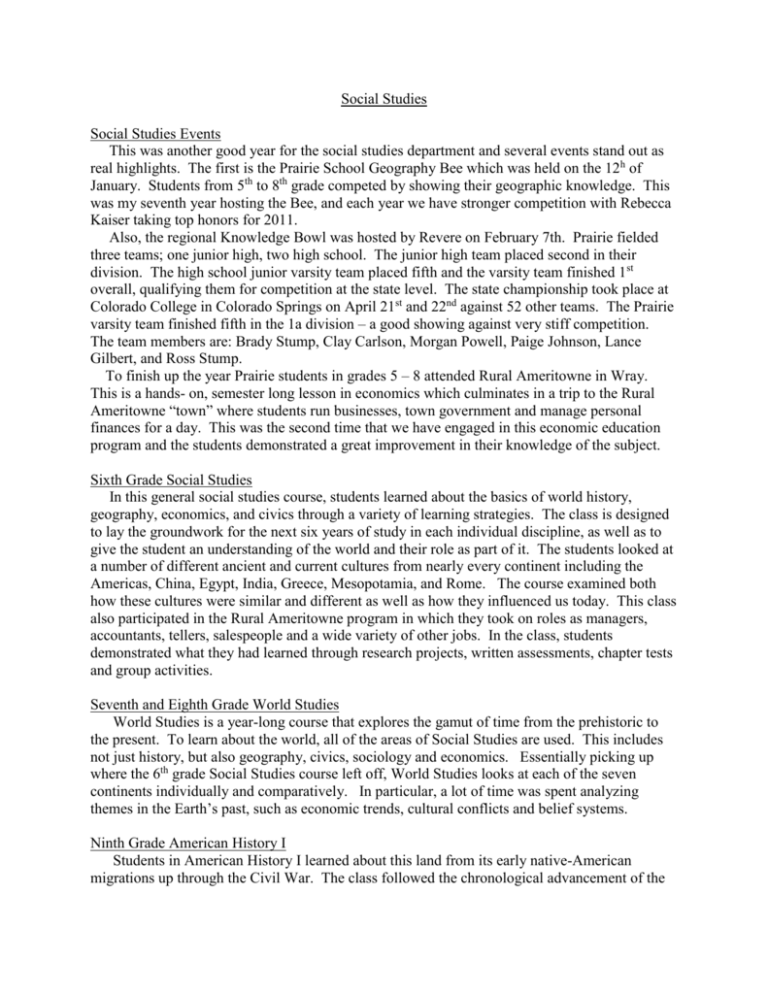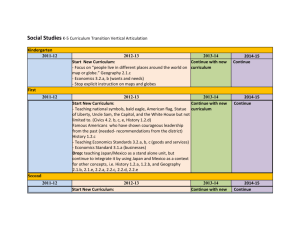Social Studies Course Overviews
advertisement

Social Studies Social Studies Events This was another good year for the social studies department and several events stand out as real highlights. The first is the Prairie School Geography Bee which was held on the 12h of January. Students from 5th to 8th grade competed by showing their geographic knowledge. This was my seventh year hosting the Bee, and each year we have stronger competition with Rebecca Kaiser taking top honors for 2011. Also, the regional Knowledge Bowl was hosted by Revere on February 7th. Prairie fielded three teams; one junior high, two high school. The junior high team placed second in their division. The high school junior varsity team placed fifth and the varsity team finished 1st overall, qualifying them for competition at the state level. The state championship took place at Colorado College in Colorado Springs on April 21st and 22nd against 52 other teams. The Prairie varsity team finished fifth in the 1a division – a good showing against very stiff competition. The team members are: Brady Stump, Clay Carlson, Morgan Powell, Paige Johnson, Lance Gilbert, and Ross Stump. To finish up the year Prairie students in grades 5 – 8 attended Rural Ameritowne in Wray. This is a hands- on, semester long lesson in economics which culminates in a trip to the Rural Ameritowne “town” where students run businesses, town government and manage personal finances for a day. This was the second time that we have engaged in this economic education program and the students demonstrated a great improvement in their knowledge of the subject. Sixth Grade Social Studies In this general social studies course, students learned about the basics of world history, geography, economics, and civics through a variety of learning strategies. The class is designed to lay the groundwork for the next six years of study in each individual discipline, as well as to give the student an understanding of the world and their role as part of it. The students looked at a number of different ancient and current cultures from nearly every continent including the Americas, China, Egypt, India, Greece, Mesopotamia, and Rome. The course examined both how these cultures were similar and different as well as how they influenced us today. This class also participated in the Rural Ameritowne program in which they took on roles as managers, accountants, tellers, salespeople and a wide variety of other jobs. In the class, students demonstrated what they had learned through research projects, written assessments, chapter tests and group activities. Seventh and Eighth Grade World Studies World Studies is a year-long course that explores the gamut of time from the prehistoric to the present. To learn about the world, all of the areas of Social Studies are used. This includes not just history, but also geography, civics, sociology and economics. Essentially picking up where the 6th grade Social Studies course left off, World Studies looks at each of the seven continents individually and comparatively. In particular, a lot of time was spent analyzing themes in the Earth’s past, such as economic trends, cultural conflicts and belief systems. Ninth Grade American History I Students in American History I learned about this land from its early native-American migrations up through the Civil War. The class followed the chronological advancement of the explorers, settlements, colonies, conflicts and independence of this continent and country. A large portion of the class is devoted to the two defining conflicts that have shaped America: the Revolutionary and Civil Wars. Tenth Grade American History II American History II is a continuation of American History I which picks up from the end of the Civil War. In this course, the students learned in-depth about key events and themes in American history from the Reconstruction through present day. The students also learned about history through a variety of primary and secondary sources including films, artifacts, letters and photos. Lessons in economics were emphasized during the year which covered the spectrum from capitalism to communism and how economics have played a major role in shaping world history during the 19th and 20th centuries. Eleventh/ Twelfth Grade Social-Psychology Social Psychology is a combination of the two disciplines Sociology and Psychology. This course is conducted in the first semester for high school juniors and seniors. The objective of the course is to further the students’ understanding of how mental processes function and change during a person’s development. This year the course began with an overview of the two separate fields and their differences and similarities. Then the class started to look at the development of a person from infancy through adulthood using both the sociological and psychological perspectives. Because of the relatively small size of the class and the wide range of material to cover, the students were able to work on developing their own unique learning projects associated with what we were studying in the text. Eleventh/ Twelfth Grade Economics Students in the second semester of their junior or senior year can choose to study Economics. The course begins with an overview of the world’s predominant economic systems. Students compare and contrast strengths and weaknesses of the various systems. There is also in in-depth analysis of our free-market economic system and how, as citizens, the students fit into that system. Lastly, students look at their own personal finances and what the future will have in hold for them. To this end, students prepare a detailed budget and look at how investing can pay off. Twelfth Grade Civics The twelfth grade Civics course is designed to help mold the graduating students into participating and productive members of our country. To this end, the students took an in-depth look both at how our unique American republican democracy functions and how the companion capitalist economic system works with it. We began the year by studying the foundations American political systems by examining documents such as the Constitution and the Bill of Rights to understand how they have affected the creation of our country. Then, students focused on the three branches of government and how they work together in balance to consider and create laws. The role of the citizen in our democracy was investigated. Lastly, since this course is for the seniors only, an enhanced section of economics was covered. This section included an introduction to micro and macroeconomics as well as home economics.






